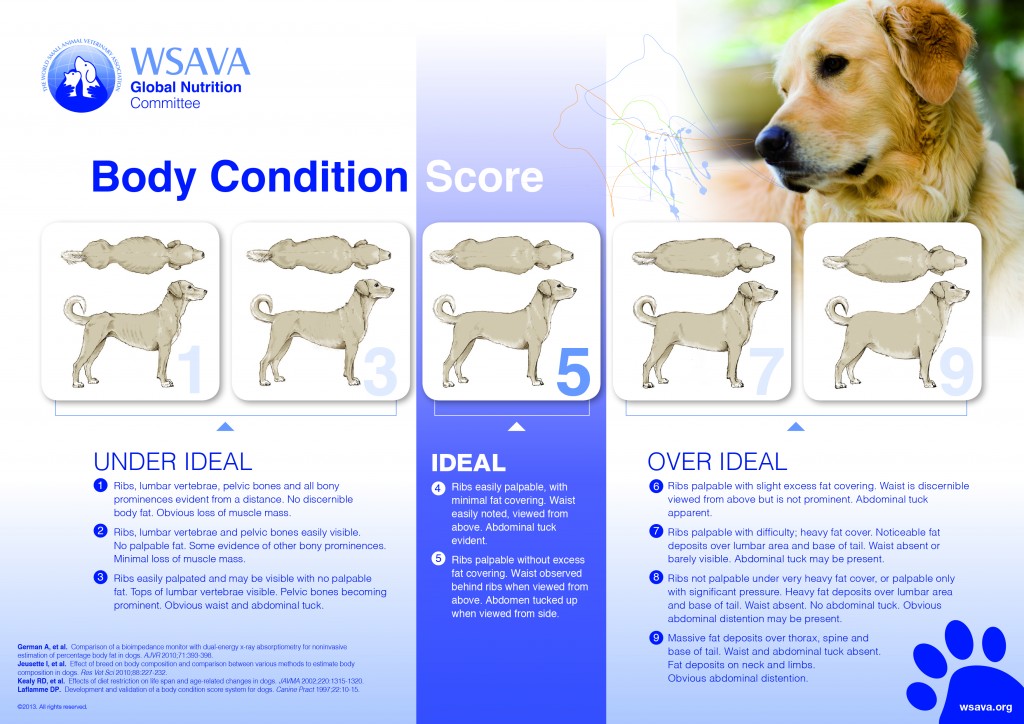Primarily due to overfeeding, dog obesity is a growing problem in Australia’s pet-owning community. Canine obesity is a serious issue, and it is related to a number of health risks. Following on from our last post, on feline weight  management, this week the team talk about overweight dogs: the risks; the causes; and the solutions.
management, this week the team talk about overweight dogs: the risks; the causes; and the solutions.
Canine obesity can cause great discomfort. Overweight dogs typically have less energy and reduced vitality. It can also increase their chances of developing serious diseases, including cancer and high blood pressure. Other common diseases related to dog obesity include:
Joint pain in dogs’ legs, hips and backs is one of the most common side effects of canine obesity. Dogs carrying extra kilos are putting extra pressure on their joints as they move. Unprovoked yelping, a reluctance or inability to move or an uneven gait may all be signs of joint pain in dogs.
If your dog presents with osteoarthritis or joint, hip or back pain, when brought into either Karingal Vet Hospital or Ballam Park Veterinary Clinic, we will work with you to develop a treatment plan. We may recommend supplements, anti-inflammatory medications and acupuncture to help ease your pet’s joint pain, but rarely will an osteoarthritis management plan be complete without discussing weight management.
Excess weight puts excess pressure on not only your dog’s bones but also its heart, liver and kidneys. Issues like hepatitis and hepatopathy (poor liver function) are common in overweight dogs, having a negative impact on mood, vitality and lifespan. Unfit and overweight dogs are at greater risk of suffering congestive heart failure.
One quick way to check your dog’s fitness level is to count their sleeping breath rate. Count the number of times your dog completes a breath (inhale and exhale) when it is asleep. If you count more than thirty breaths per minute, it may be a sign your dog is at greater risk of congestive heart failure.
Dogs with diabetes need their owners to manage their insulin levels. Diabetes and Hypothyroidism often present as lethargy or a lack of energy. Dogs with hypothyroidism or diabetes may sleep more and are less inclined to exercise, making weight management a greater challenge. For diabetes in particular, a change in diet is vital for treatment.
Dogs in the ideal weight range are less likely to develop these illnesses. But how can you tell if your dog is in the ideal weight range? To help dog owners tell if their dog is overweight, the World Small Animal Vet Association have produced this chart:

Basically, from above, a dog in a healthy weight range will have an hourglass figure. Its shoulders and hips will be wider than its stomach. From the side, its stomach will be tucked higher than its chest. When petting your dog, you should be able to count its ribs with your fingers.
Overweight dogs may have more trouble getting in and out of bed or on and off furniture. Exercise and typical day-to-day activities may be harder and will tire them out faster. If you suspect your dog is overweight, talk to one of our vets today about developing a weight management program.
Once your dog starts to lose weight, its joie de vivre should start to return. Healthier dogs have more energy, more vitality and an elevated mood. Helping your dog maintain a healthy weight is simple once you know how.
Dogs love exercise and the possible activities are endless. Games, running, walking and visiting a dog park are simple mood-boosting activities that can help your dog shed those extra kilos. Exercising with other dogs at a dog park or on a playdate is also beneficial to your dog’s development, especially for younger puppies, keeping them thin, happy and better behaved.
Exercise helps your dog burn up energy and release endorphins. Most importantly, it’s a great opportunity for them to spend time with you. Your dog loves you and having the opportunity to go on an adventure or play a game with you is one of their greatest pleasures. To keep your dog healthy and active, aim to give them 30 minutes of exercise a day.
Keeping strict meal times will help your dog maintain a healthy weight. Free feeding, leaving food out for them all day, may seem kind, but dogs lack self-control and will eat even if they do not need to, resulting in weight gain. Sticking to a regular meal schedule helps to make sure your dog only gets the energy it needs. Remember: animals get anxious when they don’t know where or when their next meal will be, so it’s important to keep your feeding schedule regular.
Studies have shown that praise can be just as effective in rewarding your dog as a food treat. Rewarding your dog with food can be a great pleasure, but if you do it too much, you will be overfeeding your dog, doing them more harm than good. Mix up their rewards, rotating between praise, pats, treats and positive attention.
We encourage owners to feed their dogs a mixture of wet and dry dog foods. If we put your dog on a diet plan, we will likely recommend Hill’s Science Diet dog food. We offer a range of Hill’s Science Diet and Prescription Diet dog foods at our retail store to cater for a range of dog diets, including weight control and weight loss regimes.
If you are worried about your dog’s weight, or would like to develop a weight control program for your pet, talk to one of our staff today. In the meantime, why not read some of our other dog-related blog posts, visit our Dog Services page, or check out our Puppy School Gallery?